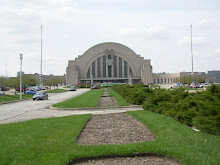A two-part series looking at the National Political Party Conventions in Cincinnati.
As the Republicans open their National Convention in St. Paul tomorrow, we remember the only Republican Party Convention in Cincinnati. In June 1876, the Republicans gathered at Exhibition Hall on Elm Street and nominated Rutherford B. Hayes for President and William A. Wheeler for Vice-President.
A diary entry from Hayes’s online diary and letters at the Rutherford B. Hayes Presidential Center gives us a great insight to what Hayes was thinking the morning of the delegate voting:

A diary entry from Hayes’s online diary and letters at the Rutherford B. Hayes Presidential Center gives us a great insight to what Hayes was thinking the morning of the delegate voting:
June 16, 1876. Friday, 8 AM
"This is the third day of the convention at Cincinnati. My friends were there a week ago tonight. One whole week of convention work. At the adjournment last night, all was ready to begin the balloting. At ten this morning the decisive balloting begins. Early in the struggle, my friends were very hopeful. But on the 13th, Blaine became decidedly the prominent man--his prospects deemed almost a certainty. There has been a gradual change on the 14th and 15th, and now it seems something more than a possibility that he will fail.
"If he fails, my chance, as a compromise candidate, seems to be better than that of any other candidate. So, we are now in suspense. I have kept cool and unconcerned to a degree that surprises me. The same may be said of Lucy. I feel that defeat will be a great relief--a setting free from bondage. The great responsibility overpowers me. That is too strong. It sobers me. It is a weight, but not overpowering. I shall try to do in all things, more than ever before, if nominated, precisely the thing that is right, to be natural, discreet, wise, moderate, and as firm in the right as it is possible for me to be. And in this spirit I await the event!"
"This is the third day of the convention at Cincinnati. My friends were there a week ago tonight. One whole week of convention work. At the adjournment last night, all was ready to begin the balloting. At ten this morning the decisive balloting begins. Early in the struggle, my friends were very hopeful. But on the 13th, Blaine became decidedly the prominent man--his prospects deemed almost a certainty. There has been a gradual change on the 14th and 15th, and now it seems something more than a possibility that he will fail.
"If he fails, my chance, as a compromise candidate, seems to be better than that of any other candidate. So, we are now in suspense. I have kept cool and unconcerned to a degree that surprises me. The same may be said of Lucy. I feel that defeat will be a great relief--a setting free from bondage. The great responsibility overpowers me. That is too strong. It sobers me. It is a weight, but not overpowering. I shall try to do in all things, more than ever before, if nominated, precisely the thing that is right, to be natural, discreet, wise, moderate, and as firm in the right as it is possible for me to be. And in this spirit I await the event!"
The ‘Blaine’ referred to is Congressman James G. Blaine of Maine who was considered the frontrunner for the Republican nomination. Hayes was not a supporter of Blaine. He, in fact, wrote General R. P. Buckland, a US Congressman from Fremont and a delegate to the Convention, on June 14 that "I do not see how we can get through in Ohio with him at the head of our ticket". But Hayes was not interested in being nominated for Vice President either if Blaine was at the head of the ticket. "I have the greatest aversion to being a candidate on the ticket with a man whose record as an upright public man is to be in question," Hayes wrote. He later instructs Buckland to inform former Ohio Governor (and Cincinnatian and Literary Club member) Edward Noyes, to withdraw his name for consideration of Vice-President should it come to that. Noyes was the head of the Ohio delegation and was the one to nominated Hayes for President from the floor.
However history tells us that Ohio Governor Hayes did emerge as a compromise candidate. He was elected on the seventh ballot after ‘reform’ (or anti-Blaine) Republicans met and all agreed to back Hayes instead of their various individual candidates. Noyes was apparently very influential in the conversation and decision to get Hayes the nomination. There was sentiment in the Party, and not just that of Hayes, was that Blaine could not win the general election and lingering questions of some corruption surrounded Blaine.
Hayes of course ends up winning the Presidency versus Democrat Samuel Tilden. How he got elected was discussed in Part II of the original Raise the Rutherford! posts.
(Interesting Note: Noyes, who lost his left leg while serving in the Civil War, served as ambassador to France during Hayes’ four years as President. After, he returned to Cincinnati and eventually was elected Justice of the Superior Court of Cincinnati. He died of a heart attack while at the Courthouse in 1890 and is buried in Spring Grove.)
(Interesting Note: Noyes, who lost his left leg while serving in the Civil War, served as ambassador to France during Hayes’ four years as President. After, he returned to Cincinnati and eventually was elected Justice of the Superior Court of Cincinnati. He died of a heart attack while at the Courthouse in 1890 and is buried in Spring Grove.)
References:
Image of the 1876 Republican Convention from "Greetings from Cincinnati".
.jpg)

No comments:
Post a Comment